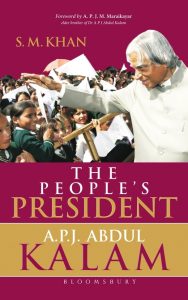
Think of Dr A.P. J. Abdul Kalam, and many laudatory adjectives come readily to mind. Scientist extraordinaire, the father of India’s space and missile programme, nation-builder, dreamer, an inspirational speaker who loved igniting young minds, with his own life serving as a model of self-fashioning and achieving despite formidable odds.
Dr Kalam’s life epitomized the audacity of dreaming as the boy from a non-descript village in Tamil Nadu rose to occupy the highest position in the world’s largest democracy by sheer self-belief and tireless hard word. For countless admirers of Dr Kalam, his life is an open book, and there is hardly anything of significance that is not known about this multi-faceted personality.
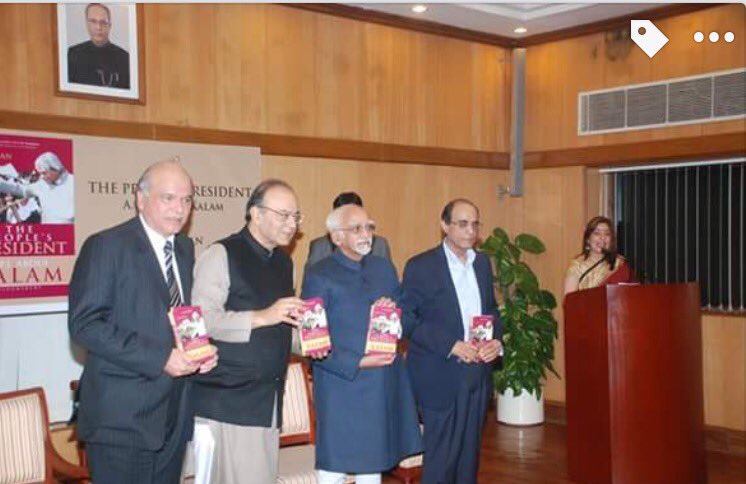
A prolific writer, Dr Kalam himself wrote many books, which gives an insight into the person he was. But given the sheer immensity of his life and the scope of his presidency, a new book by S.M. Khan, who served as press secretary to President Kalam, makes his portrait more vivid and compelling. Interspersed with anecdotes and personal conversations the author had with the president, “The People’s President” unpacks Dr Kalam’s pioneering role in raising the bar for the presidency under India’s parliament system of government and providing it the much-needed people’s touch.
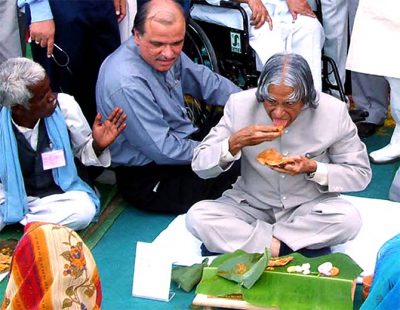
In this wide-ranging conversation with Manish Chand, Editor-in-Chief, India Writes Network, Khan, currently Director-General of the Registrar of Newspapers for India and a former spokesperson for Central Bureau of Investigation, speaks insightfully about the making of the people’s president and how Dr Kalam remapped the contours of the presidency by positioning people at the centre of his outreach and dispensing with most of ceremonial aspects associated with this exalted institution. Most important, as the author says, Dr Kalam tried to prove in those five years that the President, while remaining within the framework of the Constitution of India, can be an agent of change and transformation and contribute to the nation’s development in a tangible way.
(Excerpts from the interview)
MC: A.P.J. Abdul Kalam was a multi-faceted personality: President, statesman, scientist, orator and poet. You have aptly titled your book “The People’s President.” What made him the quintessential people’s president, the kind of person he was?
SMK: From day one when he became the President of India, he wanted to make Rashtrapati Bhavan a people’s place. When I joined him as press secretary on August 5, 2002, 12 days after he joined in as the President of India, he told me was that he wanted to make this place the people’s place, and he expected all the officers to move in this direction.
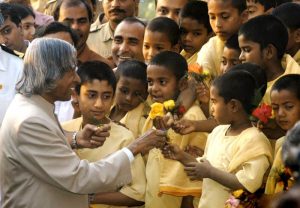 In the very first meeting, he told us clearly that all those ceremonial things –- protocol, official restrictions on people visiting Rashtrapati Bhavan, calling him His Excellency — all these things should be things of the past. He also instructed all officers to listen to the problems of the downtrodden people and try to solve their problems within the framework of the constitution. And the very first decision which he took was to abandon the practice of sending official cars of the president to places outside Delhi. Earlier, wherever the president went the practice was that the president’s official car was sent in advance from Delhi, which had to be sent in a transport plane — that was quite an expensive and cumbersome procedure. He said, “I cannot tolerate this because I will be visiting outside places frequently, and in a day I will be visiting 8 to 9 places.” His tours outside Delhi were like that, he will attend a function in the state capital, and then he will go to rural areas. Hence, it was not practical to send the presidential car to all these places. Dr Kalam also abolished the practice of having a larger chair for the Rashtrapati on a dais when attending any function. In short, he dispensed with most of ceremonial aspects associated with the post of the president.
In the very first meeting, he told us clearly that all those ceremonial things –- protocol, official restrictions on people visiting Rashtrapati Bhavan, calling him His Excellency — all these things should be things of the past. He also instructed all officers to listen to the problems of the downtrodden people and try to solve their problems within the framework of the constitution. And the very first decision which he took was to abandon the practice of sending official cars of the president to places outside Delhi. Earlier, wherever the president went the practice was that the president’s official car was sent in advance from Delhi, which had to be sent in a transport plane — that was quite an expensive and cumbersome procedure. He said, “I cannot tolerate this because I will be visiting outside places frequently, and in a day I will be visiting 8 to 9 places.” His tours outside Delhi were like that, he will attend a function in the state capital, and then he will go to rural areas. Hence, it was not practical to send the presidential car to all these places. Dr Kalam also abolished the practice of having a larger chair for the Rashtrapati on a dais when attending any function. In short, he dispensed with most of ceremonial aspects associated with the post of the president.
Another remarkable thing about President Kalam was that he was very accessible to people, media and students. During his presidency, he met and interacted with 500,000 students personally. It wasn’t a monologue, but an active interaction with students.
MC: How do you look at major decisions taken by President Kalam on contentious legal and constitutional issues?
SMK: In a chapter on legal and constitutional issues, I tried to explain that there were two sides to his personality: he was people’s president, he was a humanist, freely mingling with the children, but at the same time whenever any constitutional issue came before him, he took judicious decisions as per constitutional norms. He proved that he can handle all these things effectively and efficiently and in a spirit to preserve, protect and defend the constitution of India.
I have discussed these aspects of his personality in a chapter “Bigger than Constitution” in which I have discussed four major issues which came before him during his presidency which required constitutional interpretation. One was Prevention of Disqualification of Members of Parliament Ordinance, the second was Office of Profit Bill, the third was the dissolution of Bihar assembly and the fourth was the appointment of Judges of Supreme Court and High Court. Then the other important constitutional issue which came before him was the appointment of the government in 2004. Earlier, an issue came up when Atal Behari Vajpayee wanted an early dissolution of Lok Sabha in 2004 because Vajpayeeji recommended the dissolution of Lok Sabha eight month before his term was to be over as he wanted early elections. The question then was what will be the status of PM, whether he will be a regular prime minister or a caretaker prime minister.
Dr. Kalam was earlier of the view, his personal view that since there is no Lok Sabha now, whom the Prime Minister and cabinet will be responsible to, so he should be rendered caretaker Prime Minister. But the government’s view was that it would be a very long period, if he was caretaker PM, no major decision can be taken. Vajpayeeji was saying “we have not lost a majority in the Lok Sabha; rather we are advancing elections while enjoying a majority but getting the Lok Sabha dissolved before of our own volition, because we want to go to people a little early.” The then Law minister Arun Jaitely spent hours with Mr. Kalam and explained to him it was perfectly legal and constitutional, he also cited certain Supreme Court judgements because similar things happened once during Mrs. Gandhi’s rule also when she wanted dissolution of Lok Sabha early without being rendered caretaker PM. Finally, after giving careful thought to all these aspects and previous judgments, President Kalam agreed that Vajpayee can be a regular prime minister till the code of conduct came into force.
MC: What about the controversy about the appointment of Manmohan Singh as PM in 2004?
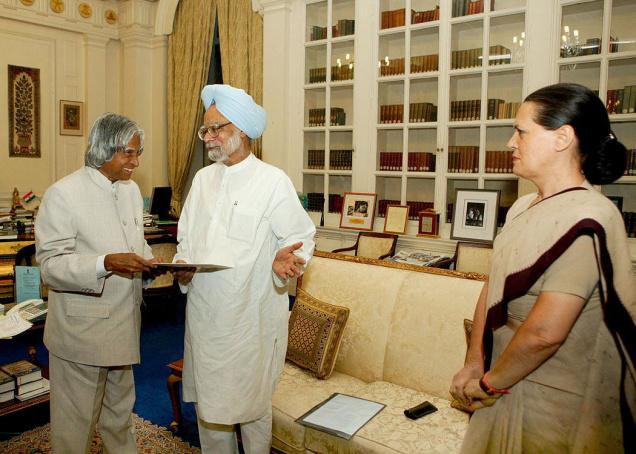 SMK: I have clarified in the book, and Dr Kalam has also clarified in his own book. There were a lot of rumours around that time that President Kalam did not swear in Sonia Gandhi because of her foreign origin. This was simply not true. He had also clarified it earlier in his book, but I have given some more facts in the book. When Sonia Gandhi came to meet him, Dr Kalam was willing to appoint her as PM, but at that time Soniaji did not come with the letter of support from other parties, she took time again and the next day she came she told Dr Kalam, “I am not interested, the Congress Legislature Party has appointed Mr Manmohan Singh as the leader of the party, so you please appoint Manmohan Singh.” In fact, the letter was ready in the name of Soniaji, but it had to be changed to Manmohan Singh. Dr. Kalam cleared it before his death — he has written this in his book also. At that time, we had also clarified. As there were so many rumours, Dr Kalam told me to issue a clarification that the foreign origin issue was never discussed with Sonia Gandhi. In the Indian Constitution, there is no distinction between a natural-born citizen and those who acquire Indian citizenship, as you know.
SMK: I have clarified in the book, and Dr Kalam has also clarified in his own book. There were a lot of rumours around that time that President Kalam did not swear in Sonia Gandhi because of her foreign origin. This was simply not true. He had also clarified it earlier in his book, but I have given some more facts in the book. When Sonia Gandhi came to meet him, Dr Kalam was willing to appoint her as PM, but at that time Soniaji did not come with the letter of support from other parties, she took time again and the next day she came she told Dr Kalam, “I am not interested, the Congress Legislature Party has appointed Mr Manmohan Singh as the leader of the party, so you please appoint Manmohan Singh.” In fact, the letter was ready in the name of Soniaji, but it had to be changed to Manmohan Singh. Dr. Kalam cleared it before his death — he has written this in his book also. At that time, we had also clarified. As there were so many rumours, Dr Kalam told me to issue a clarification that the foreign origin issue was never discussed with Sonia Gandhi. In the Indian Constitution, there is no distinction between a natural-born citizen and those who acquire Indian citizenship, as you know.
MC: In what ways does your book illuminate different facets of Dr Kalam, which were not earlier accessible to people?
SMK: No, that is not actually the idea, so much has been written about Dr Kalam. And Dr. Kalam himself wrote so many books. The idea was not to give new things/facets, I have tried to share my own experiences with him, some anecdotes. I have tried to explain in my book that he was a person who really wanted to do something for his country, he wanted to see India a really developed country. He was also totally detached from material things, he had no personal or family interest in his mind at any stage of his presidency. He wanted to be there as a common man, and not serving interest of himself or family, relatives or friends. He had no vested interests – this is what I have tried to bring out in the book.
MC: Dr Kalam was truly passionate about his country. He expounded very passionately about his 2020 vision of India. In the transformation of the country, how would you evaluate and access his role?
SMK: Before he became the President of India, he was working on this mission. In fact, the Ministry of Science and Technology and the Planning Commission, based on his proposals, had set up a committee to give a vision of India 2020 in which about 500 scientists were working under Dr. Kalam — this was before he became the President of India and he gave a blueprint of India 2020 much before that.
MC: What about President Kalam’s contribution to Indian diplomacy, his role in expanding India’s diplomatic footprints?
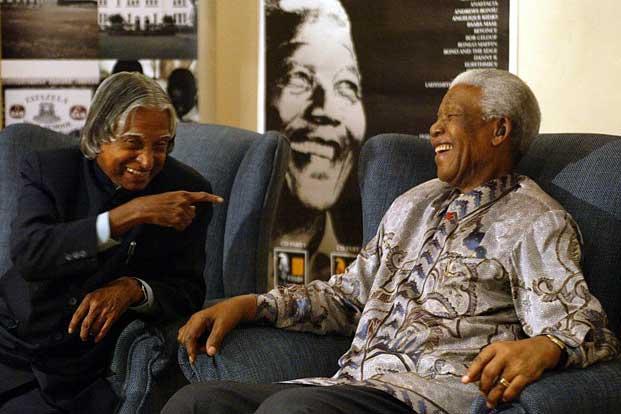 SMK: He tried to market India. He visited only 16 countries in 5 years. He went to every country, wherever he went, with a purpose. In his first year in office, he did not go anywhere and chose to concentrate only on visits within the country. The first set of countries he chose to visit were UAE, Sudan and Bulgaria. He had chosen the UAE because of a large number of the Indian community there and he wanted to forge close economic close ties with the UAE, which was in India’s interests, and to give a message to NRIs working there. He had chosen Sudan because at that time India was showing a lot of interest in oil fields in Sudan and ONGC Videsh was working there in a big way. He wanted to boost their efforts. Sudan was the largest Arab country in North Africa, and no Indian president had ever visited Sudan. In his visit to South Africa, he announced the landmark Pan-Africa e-network in the pan-African parliament in Johannesburg. He announced this project after having a conversation with Prime Minister Manmohan Singh, and the project was later executed with a record speed. This project remained very dear to his heart till he remained president and even after that.
SMK: He tried to market India. He visited only 16 countries in 5 years. He went to every country, wherever he went, with a purpose. In his first year in office, he did not go anywhere and chose to concentrate only on visits within the country. The first set of countries he chose to visit were UAE, Sudan and Bulgaria. He had chosen the UAE because of a large number of the Indian community there and he wanted to forge close economic close ties with the UAE, which was in India’s interests, and to give a message to NRIs working there. He had chosen Sudan because at that time India was showing a lot of interest in oil fields in Sudan and ONGC Videsh was working there in a big way. He wanted to boost their efforts. Sudan was the largest Arab country in North Africa, and no Indian president had ever visited Sudan. In his visit to South Africa, he announced the landmark Pan-Africa e-network in the pan-African parliament in Johannesburg. He announced this project after having a conversation with Prime Minister Manmohan Singh, and the project was later executed with a record speed. This project remained very dear to his heart till he remained president and even after that.
MC: Finally, to sum up, what was Dr Kalam’s contribution in transforming the position of presidency?
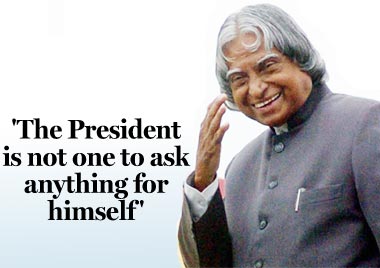 SMK: He tried to prove in those five years that the President, while remaining within the framework of the Constitution of India, can do a lot for the transformation of the country. He tried to nullify the popular stereotype that the President can only be a ceremonial figure; he can be an agent of change and transformation and contribute to the nation’s development in a tangible way, which he really did.
SMK: He tried to prove in those five years that the President, while remaining within the framework of the Constitution of India, can do a lot for the transformation of the country. He tried to nullify the popular stereotype that the President can only be a ceremonial figure; he can be an agent of change and transformation and contribute to the nation’s development in a tangible way, which he really did.
Author Profile
- India Writes Network (www.indiawrites.org) is an emerging think tank and a media-publishing company focused on international affairs & the India Story. Centre for Global India Insights is the research arm of India Writes Network. To subscribe to India and the World, write to editor@indiawrites.org. A venture of TGII Media Private Limited, a leading media, publishing and consultancy company, IWN has carved a niche for balanced and exhaustive reporting and analysis of international affairs. Eminent personalities, politicians, diplomats, authors, strategy gurus and news-makers have contributed to India Writes Network, as also “India and the World,” a magazine focused on global affairs.
Latest entries
 DiplomacyJanuary 5, 2026India walks diplomatic tightrope over US operation in Venezuela
DiplomacyJanuary 5, 2026India walks diplomatic tightrope over US operation in Venezuela India and the WorldNovember 26, 2025G20@20: Africa’s Moment – The Once and Future World Order
India and the WorldNovember 26, 2025G20@20: Africa’s Moment – The Once and Future World Order DiplomacyOctober 4, 2025UNGA Resolution 2758 Must Not Be Distorted, One-China Principle Brooks No Challenge
DiplomacyOctober 4, 2025UNGA Resolution 2758 Must Not Be Distorted, One-China Principle Brooks No Challenge India and the WorldJuly 26, 2025MPs, diplomats laud Operation Sindoor, call for national unity to combat Pakistan-sponsored terror
India and the WorldJuly 26, 2025MPs, diplomats laud Operation Sindoor, call for national unity to combat Pakistan-sponsored terror







